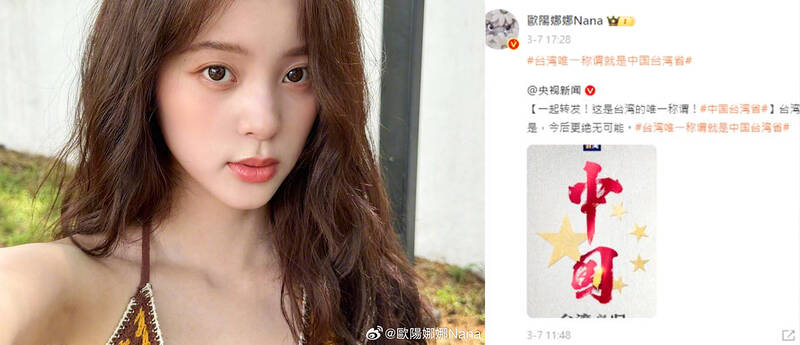Twenty Taiwanese entertainers who shared Chinese propaganda on social media are being investigated and might face fines, the Mainland Affairs Council (MAC) said.
The entertainers allegedly shared posts on Chinese social media platform Sina Weibo saying that “Taiwan has never been a country and never will be, and it should only be referred to as a province of China,” the MAC said, adding that it is investigating the issue with the Ministry of Culture.
The artists have all been contacted for an explanation, and those who fail to reply would “face penalties,” it added.

Photo: Screen grab from Ouyang Nana’s Sina Weibo account
The artists were named as Patty Hou (侯佩岑), Angela Chang (張韶涵), Ouyang Nana (歐陽娜娜), Ouyang Didi (歐陽娣娣), Aska Yang (楊宗緯), Joe Chen (陳喬恩), Michelle Chen (陳妍希), Jiro Wang (汪東城), Mark Chao (趙又廷), Julian Chen (陳志朋), Huang Xiyan (黃曦彥), Darren Chen (官鴻), Lin Bo-rei (林柏叡), Riley Wang (王以綸), Edward Chen (陳昊森), Wanyan Luorong (完顏洛絨), Chiang Yu-heng (姜育恆) and Wen Qi (文淇), as well as two others whose identities were not revealed.
The posts were allegedly made after Chinese Minister of Foreign Affairs Wang Yi (王毅) made the statements at a Chinese National People’s Congress news conference in March.
Wang’s statements were posted to Weibo by Chinese state broadcaster CCTV alongside images containing the words “Taiwan is China’s and it must return,” prompting the artists to make their own posts sharing the images and statements.
At the time, the MAC issued a statement criticizing the artists’ posts, saying they could endanger national security. The council said it would investigate whether the artists had “cooperated with Beijing to undermine the sovereignty of the Republic of China,” which would contravene the Act Governing Relations Between the People of the Taiwan Area and the Mainland Area (臺灣地區與大陸地區人民關係條例).
MAC Deputy Minister and spokesman Liang Wen-chieh (梁文傑) on Thursday said that no penalties had yet been imposed, but that the 20 entertainers had been contacted to explain the posts, and that 10 had replied.
The government has set a deadline for responses, and those who fail to reply by the deadline would be considered to have forfeited their opportunity to explain, thereby resulting in penalties, he added.
Chinese-language SET News on Friday reported that many of the artists or their agencies contacted by the MAC responded that they “did not know” their actions were illegal, “had no intention of contravening regulations” or were “not familiar with government rules” on the matter.
Artists cannot evade accountability by making such responses, Liang said, adding that the MAC “would not consider the matter closed” in such instances.

Trips for more than 100,000 international and domestic air travelers could be disrupted as China launches a military exercise around Taiwan today, Taiwan’s Civil Aviation Administration (CAA) said yesterday. The exercise could affect nearly 900 flights scheduled to enter the Taipei Flight Information Region (FIR) during the exercise window, it added. A notice issued by the Chinese Civil Aviation Administration showed there would be seven temporary zones around the Taiwan Strait which would be used for live-fire exercises, lasting from 8am to 6pm today. All aircraft are prohibited from entering during exercise, it says. Taipei FIR has 14 international air routes and

Taiwan lacks effective and cost-efficient armaments to intercept rockets, making the planned “T-Dome” interception system necessary, two experts said on Tuesday. The concerns were raised after China’s military fired two waves of rockets during live-fire drills around Taiwan on Tuesday, part of two-day exercises code-named “Justice Mission 2025.” The first wave involved 17 rockets launched at 9am from Pingtan in China’s Fujian Province, according to Lieutenant General Hsieh Jih-sheng (謝日升) of the Office of the Deputy Chief of the General Staff for Intelligence at the Ministry of National Defense. Those rockets landed 70 nautical miles (129.6km) northeast of Keelung without flying over Taiwan,

City buses in Taipei and New Taipei City, as well as the Taipei MRT, would on Saturday begin accepting QR code payments from five electronic payment providers, the Taipei Department of Transportation said yesterday. The new option would allow passengers to use the “transportation QR code” feature from EasyWallet, iPass Money, iCash Pay, Jkopay or PXPay Plus. Passengers should open their preferred electronic payment app, select the “transportation code” — not the regular payment code — unlock it, and scan the code at ticket readers or gates, General Planning Division Director-General Liu Kuo-chu (劉國著) said. People should move through the

The Ministry of National Defense (MND) today released images of the military tracking China’s People's Liberation Army (PLA) movements during the latest round of Chinese drills around Taiwan. The PLA began "Justice Mission 2025" drills today, carrying out live-fire drills, simulated strikes on land and maritime targets, and exercises to blockade the nation's main ports. The exercises are to continue tomorrow, with the PLA announcing sea and air space restrictions for five zones around Taiwan for 10 hours starting from 8:30am. The ministry today released images showing a Chinese J-16 fighter jet tracked by a F-16V Block 20 jet and the